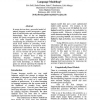Free Online Productivity Tools
i2Speak
i2Symbol
i2OCR
iTex2Img
iWeb2Print
iWeb2Shot
i2Type
iPdf2Split
iPdf2Merge
i2Bopomofo
i2Arabic
i2Style
i2Image
i2PDF
iLatex2Rtf
Sci2ools
ACL
1998
1998
Beyond N-Grams: Can Linguistic Sophistication Improve Language Modeling?
It seems obvious that a successful model of natural language would incorporate a great deal of both linguistic and world knowledge. Interestingly, state of the art language models for speech recognition are based on a very crude linguistic model, namely conditioning the probability of a word on a small fixed number of preceding words. Despite many attempts to incorporate more sophisticated information into the models, the n-gram model remains the state of the art, used in virtually all speech recognition systems. In this paper we address the question of whether there is hope in improving language modeling by incorporating more sophisticated linguistic and world knowledge, or whether the ngrams are already capturing the majority of the information that can be employed.
| Added | 01 Nov 2010 |
| Updated | 01 Nov 2010 |
| Type | Conference |
| Year | 1998 |
| Where | ACL |
| Authors | Eric Brill, Radu Florian, John C. Henderson, Lidia Mangu |
Comments (0)

